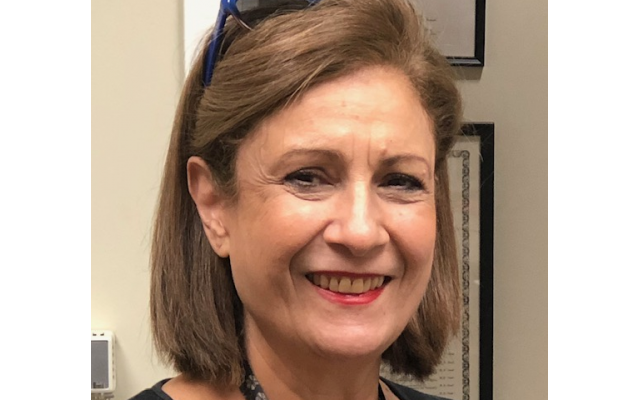Dr. Cooper’s Yellow Vest Encounter
Atlanta Psychiatrist Annie Nataf Cooper Ruspoli, who grew up in Paris, shares her experience following the incendiary Yellow Vest protests she encountered on a recent trip abroad.
After 37 years with the Atlanta Journal-Constitution and now with the AJT, , Jaffe’s focus is lifestyle, art, dining, fashion, and community events with emphasis on Jewish movers and shakers.
Protests involving the Yellow Vests – known as the Yellow Jackets in America – took an ugly turn this week in France, clashing with police and embracing anti-Semitic messages in the streets and on social media. For the first time, synagogues in France closed their doors because of security concerns.
One such sign hanging over the road between Paris and Marseilles referred to French President Emmanuel Macron as “the whore of the Jews” while others implied that it was wealthy Jews who had chosen Macron as their president and that they are responsible for the current economic situation.
Last week 37 tombstones and a Holocaust monument in the Jewish cemetery outside of Strasbourg were desecrated with swastikas and the “14 words,” a slogan used globally by white supremacists and neo-Nazis. Members of the Yellow Vests movement encouraged protesting Chanukah celebrations, claiming that France suffered while Jews were celebrating.
Atlanta Psychiatrist Annie Nataf Cooper Ruspoli grew up in Paris, where she graduated medical school. After completing a residency at Emory University, she settled here – still managing to visit France three times a year. This last trip, November 2018, she landed in the middle of the incendiary Yellow Vest protests that we see on national news. Dr. Cooper shares her first-hand experience about life in France, anti-Semitism and President Macron.
Jaffe: Many don’t realize that France has the world’s third largest Jewish population, 480,000. Growing up in Paris in the 50s and 60s, what was Jewish life like?
Cooper: I went to public schools and Jews were well-integrated. My best friend was Catholic; she went to Temple with me, and I went to church with her. Post-Holocaust horror and guilt were prevalent, and people bent over backwards to be welcoming. In my school, my principal and teacher were part of the [French] Resistance, and the school halls once had Holocaust artifacts and chilling exhibits of soap and lamps composed of victims.
The first time I noticed anti-Semitism was after the Six-Day War when [President Charles] De Gaulle disseminated negative words about Israel.
Jaffe: Based on what you observe now, do French Jews feel more threatened?
Cooper: Absolutely, there is more security in synagogues, Jewish schools, stores etc. I would call it “a very tense situation.” Anti-Semitic acts are up 69 percent since the beginning of 2018.
After the April murders, school shooting, and grocery store attacks, we have seen cemetery desecration, swastikas on walls, etc.
These Yellow Vest demonstrations have brought out people from the extreme left and extreme right, many of whom are anti-Semitic for different reasons.
Jaffe: Last month you went to Paris to visit family. What did you experience in terms of the Yellow Vest demonstrations?
Cooper: Everyone is supposed to have these yellow vests in their cars incidentally.
The demonstrators that I saw in the countryside were peaceful. They approached us at the grocery, and although they took over the toll road booths, they were friendly and explained their grievances and circumstances. Their grievances stemmed from the gas tax, the past increased emphasis on diesel cars, the reduction of local train stations and public transportation that allow working folks to get to their jobs. This was done in the interest of reducing climate change. Unfortunately, the working class has to feed their families and that takes priority. The anger increased as Macron did not come out initially to address the complaints.
Jaffe: What we saw on TV was not peaceful.
Cooper: Agitators and bad people took advantage of the situation by looting and swarming the side streets. My sister who lives off Les Champs-Élysées (an affluent area), said she was very fearful and could not open her windows for fear of smoke inhalation and blasts.
Wealthy areas were targeted to cause more disruption.
Jaffe: Macron has since coalesced? His approval rating was less than 18 percent.
Cooper: Yes, he removed the gas tax, acknowledged grievances and increased the minimum wage. Also, in France there is an overall depression and general dissatisfaction … about France being or not being in the European Union.
Note that Macron was portrayed in newspapers as “The Whore of the Jews,” as his past was working with a Rothschild bank, associated with the very rich.
Jaffe: What is happening now to lower the anti-Semitic rhetoric?
Cooper: The Minister of Education issued a movement beginning in 2019 to monitor schools and tamp Pro Palestinian exhibits expressing sympathy towards Arabs actively portraying Israel as “bad.” Also 300 celebrities and politicians, including ex-President [Nicolas] Sarkozy (reputed to have a Jewish grandparent), signed a document to denounce anti-Semitism and express alarm at its rise in France.
Jaffe: Do you see an increase in Muslim population?
Cooper: It is much more frequent to hear people speaking Arabic in the street. I visited a Paris hospital emergency room a few years back and was surprised to see all the signs and notices written in Arabic as well as in French.
Jaffe: On the lighter side, what’s the best part about returning/visiting France?
Cooper: Ah, I love the food, shopping and family back in France. Also, our house in Bordeaux in the countryside is where we spend quiet time. After all, my early memories are there. Nice that new memories in the States feature my three grandsons!




comments